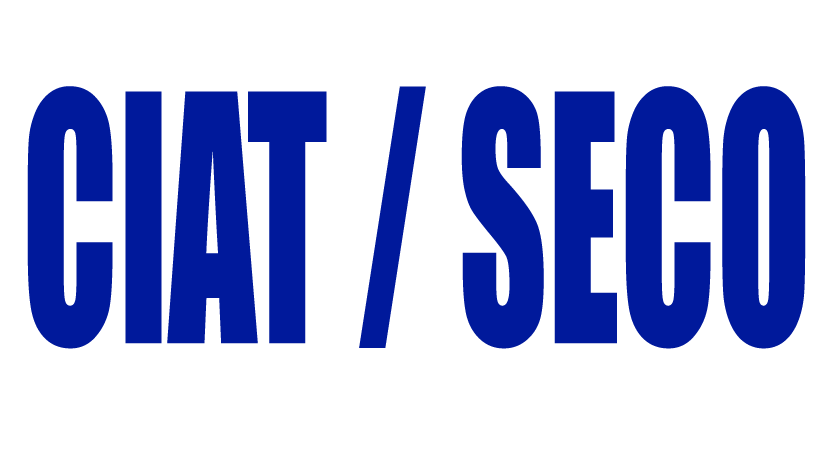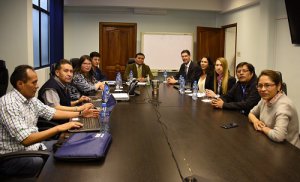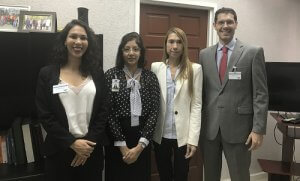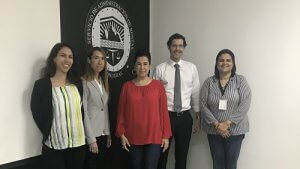The CIAT-SECO Cooperation Program: 4 years strengthening tax administrations of Latin America and Caribbean

After four years of work, the cooperation program initiated in 2015 by the Inter-American Center of Tax Administrations (CIAT) and the State Secretariat for Economic Affairs of the Swiss Government (SECO) finalizes.
This program, in which SECO provides financial resources and CIAT provides management, has also relied on the financial and in kind counterparts from third parties and beneficiary countries, which have been Bolivia, El Salvador, Guatemala, Guyana, Honduras and Nicaragua .
Starting in 2019, the officials of the CIAT Executive Secretariat have visited each of the beneficiary countries in order to discuss the progress made under the CIAT-SECO program and evaluate how to move forward on these issues in the coming months.
Among the progress registered in the visited tax administrations, we can highlight:
 The SIN of Bolivia has generated and registered progress with their first cases of transfer pricing. Product of audits carried out in this field, the SIN has determined certain adjustments and penalties. Also in the field of Double Taxation Agreements, it has been possible to update and improve the procedures for applying them. The work carried out in the risk area has led to identify inaccuracies in the tax returns, which resulted in 21 orders of control and 2 orders of external verification.
The SIN of Bolivia has generated and registered progress with their first cases of transfer pricing. Product of audits carried out in this field, the SIN has determined certain adjustments and penalties. Also in the field of Double Taxation Agreements, it has been possible to update and improve the procedures for applying them. The work carried out in the risk area has led to identify inaccuracies in the tax returns, which resulted in 21 orders of control and 2 orders of external verification.
The DGII of El Salvador  has made the first information requests under international standards. These were 12 requests that allowed generating two tax adjustments. In the field of extensive control, pilot tests were aimed at taxpayers with a VAT ratio of economic activity suboptimal to their economic activity, and satisfactory results were obtained.
has made the first information requests under international standards. These were 12 requests that allowed generating two tax adjustments. In the field of extensive control, pilot tests were aimed at taxpayers with a VAT ratio of economic activity suboptimal to their economic activity, and satisfactory results were obtained.
The SAT of Guatemala had an unprecedented development in the two areas of project  implementation. As regards transfer pricing, risks were identified for the first time, resulting in 34 audits. Concerning the second project, electronic invoicing, the implementation of the new model of electronic invoice was approved in March 2018. Up to date, more than three thousand issuers have been enabled and more than six million documents have been issued.
implementation. As regards transfer pricing, risks were identified for the first time, resulting in 34 audits. Concerning the second project, electronic invoicing, the implementation of the new model of electronic invoice was approved in March 2018. Up to date, more than three thousand issuers have been enabled and more than six million documents have been issued.
The GRA of Guyana has created an indicator regarding the expiration date of the tax returns (Return Due Date Indicator).  This indicator has identified for the first time the percentage of taxpayers who file their returns on time. The program has also supported the design of a risk model for tax administration. Product of the results of the application of the risk model, the GRA has identified new unregistered taxpayers. Regarding the field of technical audit of multinational companies, the GRA has created in 2017 a Large Taxpayers Division. The Unit is responsible for the audit of large companies, also involving issues related to international taxation, which have gained significant importance in recent years because of the initiatives promoted by the G20/OECD and the international community.
This indicator has identified for the first time the percentage of taxpayers who file their returns on time. The program has also supported the design of a risk model for tax administration. Product of the results of the application of the risk model, the GRA has identified new unregistered taxpayers. Regarding the field of technical audit of multinational companies, the GRA has created in 2017 a Large Taxpayers Division. The Unit is responsible for the audit of large companies, also involving issues related to international taxation, which have gained significant importance in recent years because of the initiatives promoted by the G20/OECD and the international community.
The SAR of Honduras has notified audits to companies from relevant sectors of the  economy, which presented risk of default. Thanks to this work, nine transfer-pricing adjustments have been reported. The SAR has made initial requests for international exchange of information. With regard to risk management, the SAR has developed 46 indicators to produce risk in different segments of taxpayers and economic sectors, for a timely decision making (preventive or corrective).
economy, which presented risk of default. Thanks to this work, nine transfer-pricing adjustments have been reported. The SAR has made initial requests for international exchange of information. With regard to risk management, the SAR has developed 46 indicators to produce risk in different segments of taxpayers and economic sectors, for a timely decision making (preventive or corrective).
The DGI of Nicaragua has automated the process of taxpayer service; this has been  possible thanks to the interconnection with other government institutions and computerizing the registry of on-site assistance; they have implemented the concept of “previous appointment”; and “reports”. The latter as a query for the FAQ tool, they have structurally standardized the attention to taxpayers nationwide with a catalog of unified service, strengthened the academic profile of the officers with specialties oriented to best practices, managed to control the service times, favoring the strategic decision-making within the framework of public attention.
possible thanks to the interconnection with other government institutions and computerizing the registry of on-site assistance; they have implemented the concept of “previous appointment”; and “reports”. The latter as a query for the FAQ tool, they have structurally standardized the attention to taxpayers nationwide with a catalog of unified service, strengthened the academic profile of the officers with specialties oriented to best practices, managed to control the service times, favoring the strategic decision-making within the framework of public attention.
We thank SECO for the valuable support provided to our member countries, and underline the commitment shown by the tax administrations of the CIAT-SECO Cooperation Program, whose authorities have provided an excellent support during the program execution.
2,297 total views, 3 views today
